C. Gene Wilkes's Blog, page 15
June 14, 2011
Serve Sunday 2011
 Sunday, June 12, Legacy Church abandoned its usual routine of gathering to worship in music and word to live out our core value, "We are most like Jesus when we serve." (Mark 10:45) We gathered for instructions, prayer, and a song, then headed out to serve. Some groups started earlier that morning.
Sunday, June 12, Legacy Church abandoned its usual routine of gathering to worship in music and word to live out our core value, "We are most like Jesus when we serve." (Mark 10:45) We gathered for instructions, prayer, and a song, then headed out to serve. Some groups started earlier that morning.We spread out to serve two homes that were part of Plano's Love Where You Live program, two elementary schools through their PTAs, and the campus of Legacy Church. A group also serve the neighborhood around our campus by prayer walking through the streets and praying for the families there.
It's a risk any time you do this during "regularly scheduled services" on a Sunday morning. You risk guests showing up to check you out (but what better way to demonstrate who you really are), forgetful members who show up not ready to work (they could run home and change and maybe read their weekly eletter and worship guide each week), and people sent by God seeking a spiritual boost in their lives. (I trust our people would engage them, and they may actually have more time to spend speaking to them than if the service went on as usual.) Then there's the offering! (That's what egiving and faithful giving is about.)
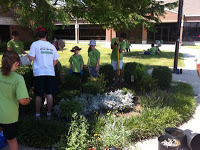 This is also a great way for families to worship together! If "worship is a lifestyle," then what better way to teach your children what being the church through service in the community looks like?
This is also a great way for families to worship together! If "worship is a lifestyle," then what better way to teach your children what being the church through service in the community looks like?One team leader wrote:
Our homeowner, ________, felt so blessed at every step along this process. She got all manner of repairs completed on her house (that she has owned since 1971 when she bought it new!) including several that were not on the list. In addition, she got her house insulated for FREE (thanks ______ for mentioning this to her) and even found replacement light fixtures available on clearance. She frequently praised God as she worked side-by-side with everyone throughout the day.
 To bless someone through serving in the name of Jesus is what the church scattered looks like!
To bless someone through serving in the name of Jesus is what the church scattered looks like!This was the second year we have experienced this, and I believe we will do it again. Give it a try. It will test what you truly believe about who and what the church is.
You can see more pictures from the day on the Legacy Church facebook page.
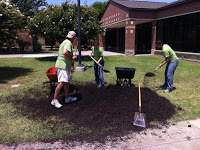
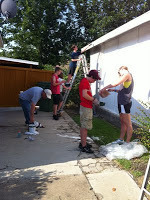
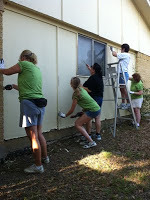
Published on June 14, 2011 06:36
June 7, 2011
tuKola and the church in Cuba
I recently traveled to Cuba with B H Carroll Theological Institute to teach students who are part of Carroll's masters program there. I traveled with three others from Carroll on religious visas to serve in Camaguey. This was my third trip to Cuba, and I was as impressed with the people and the church on this trip as I was the first time I went there.
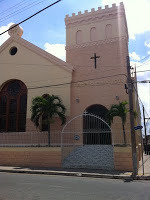 We held classes in the buildings and among the people who are Primera Iglesia Bautista in Camaguey. The building was built in 1904 and sits in the heart of the historic city. But it is not the quaint nature of the structures that draws your heart to the church; it is the people.
We held classes in the buildings and among the people who are Primera Iglesia Bautista in Camaguey. The building was built in 1904 and sits in the heart of the historic city. But it is not the quaint nature of the structures that draws your heart to the church; it is the people.
The Cuban Christians are warm, hospitable, and truly love the Lord. They accept what they have been given, and they live joyful, hope-filled lives in Christ. They take trains, walk, ride their bikes, or "BC Taxis," to gather as God's people to worship in song, to learn God's Word, and to pray. And, oh, how they pray! We gathered on Tuesday evening after a day of teaching to join them in their weekly prayer service, which went for over two hours. They believe with all their hearts God answers prayers, so they humbly seek God through "by prayer, and petition, with thanksgiving." (Phil. 4:6) We made petitions and heard stories of answered prayers--and while I did not understand fully the man's prayer in Spanish for my wife and me, I knew God's heart was moved by my brother's prayer of the heart!
I also noticed and appreciated that their music was their own and reflected their culture and heritage. (No imported pipe organs and robed choir.) I recognized one or two praise songs from the Americas, but they mostly sang in their heart language to tunes that were theirs. I also did not sense any imported, stock theology from outside. They translate the Bible into their lives as the basis for what they believe. This was their faith, not an imported substitute. The ekklesia is alive and well in Cuba.
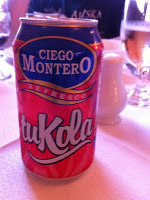 The Coke-Cola of Cuba is tuKola, "your cola." We drank it at lunch and supper every day, and it came to symbolize for me the hospitality and sweetness of the people. We lingered after meals to hear stories and share our own. We drank liters of the stuff! Each night I sat on the roof top of our hotel, the Gran Hotel, and drank a can as I read. When I see the image of the can of cola, I remember the shared meals, faith, and culture of those who are the church in Cuba and know they are thriving there.
The Coke-Cola of Cuba is tuKola, "your cola." We drank it at lunch and supper every day, and it came to symbolize for me the hospitality and sweetness of the people. We lingered after meals to hear stories and share our own. We drank liters of the stuff! Each night I sat on the roof top of our hotel, the Gran Hotel, and drank a can as I read. When I see the image of the can of cola, I remember the shared meals, faith, and culture of those who are the church in Cuba and know they are thriving there.
I look forward to my next trip and hope some of you can go with me.
 We held classes in the buildings and among the people who are Primera Iglesia Bautista in Camaguey. The building was built in 1904 and sits in the heart of the historic city. But it is not the quaint nature of the structures that draws your heart to the church; it is the people.
We held classes in the buildings and among the people who are Primera Iglesia Bautista in Camaguey. The building was built in 1904 and sits in the heart of the historic city. But it is not the quaint nature of the structures that draws your heart to the church; it is the people.The Cuban Christians are warm, hospitable, and truly love the Lord. They accept what they have been given, and they live joyful, hope-filled lives in Christ. They take trains, walk, ride their bikes, or "BC Taxis," to gather as God's people to worship in song, to learn God's Word, and to pray. And, oh, how they pray! We gathered on Tuesday evening after a day of teaching to join them in their weekly prayer service, which went for over two hours. They believe with all their hearts God answers prayers, so they humbly seek God through "by prayer, and petition, with thanksgiving." (Phil. 4:6) We made petitions and heard stories of answered prayers--and while I did not understand fully the man's prayer in Spanish for my wife and me, I knew God's heart was moved by my brother's prayer of the heart!
I also noticed and appreciated that their music was their own and reflected their culture and heritage. (No imported pipe organs and robed choir.) I recognized one or two praise songs from the Americas, but they mostly sang in their heart language to tunes that were theirs. I also did not sense any imported, stock theology from outside. They translate the Bible into their lives as the basis for what they believe. This was their faith, not an imported substitute. The ekklesia is alive and well in Cuba.
 The Coke-Cola of Cuba is tuKola, "your cola." We drank it at lunch and supper every day, and it came to symbolize for me the hospitality and sweetness of the people. We lingered after meals to hear stories and share our own. We drank liters of the stuff! Each night I sat on the roof top of our hotel, the Gran Hotel, and drank a can as I read. When I see the image of the can of cola, I remember the shared meals, faith, and culture of those who are the church in Cuba and know they are thriving there.
The Coke-Cola of Cuba is tuKola, "your cola." We drank it at lunch and supper every day, and it came to symbolize for me the hospitality and sweetness of the people. We lingered after meals to hear stories and share our own. We drank liters of the stuff! Each night I sat on the roof top of our hotel, the Gran Hotel, and drank a can as I read. When I see the image of the can of cola, I remember the shared meals, faith, and culture of those who are the church in Cuba and know they are thriving there.I look forward to my next trip and hope some of you can go with me.
Published on June 07, 2011 07:45
May 17, 2011
Missional Has a Message
No one needs to be a soothsayer to divine that the missional movement has gained momentum over the last five to ten years. It's been around a lot longer, but missional is now the catchword for young, cutting-edge, in-the-streets followers of Jesus.
Personally, I am pleased with what's happening. The movement grew out of a realization that the church is not making an impact on the culture in post-Christian, Western countries and something needed to change. From Lesslie Newbigin and David Bosch's early calls to mission to Alan Hirsch and Alan Roxburgh's stylized methods of how to go about it, the momentum to be "on mission" with Christ in the world rather than maintain the institutional church and its programs is now "it."
I have two observations about the movement, of which I consider myself and Legacy Church late adapters.
First, to be truly missional requires adaptive change, not tweaks that make you look missional. You can't add a food drive or a Habitat for Humanity house build to your church calendar to become missional. It requires deep changes to your values and practices. Too many church staff members seek to reflect the latest trends in ministry by adding a new mission project and miss the reality that missional is not an add-on. It's the DNA of who you are and what you do.
Those of you seeking to be missional by adding a project or two to what you are already doing, STOP. Either leave like Matthew or Peter what you are doing and follow Jesus' leadership into the mission field, or get back to what you were doing before you went to the last conference.
Second, missional has a message. My main concern about the missional call to plant yourself in a neighborhood or meet a community or global need is that more is said about the methods than the message. We want to know how rather than get to know the Who of our calling.
The end game of all the deconstruction of church as we know it and the creation of communities of faith in a neighborhood is a changed life that comes through an authentic relationship with Jesus, the Christ; and, that life-change comes through the message of Jesus in a real-life relationship with someone.
We can dig wells, build community centers, and host art festivals, but if there is no message of the Good News of Jesus then our efforts are as empty as the programs we advertise to get people to come onto our campus each weekend.
I love how God is reviving and reforming the church in America again. I don't want us to miss it. But, we cannot leave the message of Christ behind as we chase the enticing new forms of being the people of God in this world.

Personally, I am pleased with what's happening. The movement grew out of a realization that the church is not making an impact on the culture in post-Christian, Western countries and something needed to change. From Lesslie Newbigin and David Bosch's early calls to mission to Alan Hirsch and Alan Roxburgh's stylized methods of how to go about it, the momentum to be "on mission" with Christ in the world rather than maintain the institutional church and its programs is now "it."
I have two observations about the movement, of which I consider myself and Legacy Church late adapters.
First, to be truly missional requires adaptive change, not tweaks that make you look missional. You can't add a food drive or a Habitat for Humanity house build to your church calendar to become missional. It requires deep changes to your values and practices. Too many church staff members seek to reflect the latest trends in ministry by adding a new mission project and miss the reality that missional is not an add-on. It's the DNA of who you are and what you do.
Those of you seeking to be missional by adding a project or two to what you are already doing, STOP. Either leave like Matthew or Peter what you are doing and follow Jesus' leadership into the mission field, or get back to what you were doing before you went to the last conference.
Second, missional has a message. My main concern about the missional call to plant yourself in a neighborhood or meet a community or global need is that more is said about the methods than the message. We want to know how rather than get to know the Who of our calling.
The end game of all the deconstruction of church as we know it and the creation of communities of faith in a neighborhood is a changed life that comes through an authentic relationship with Jesus, the Christ; and, that life-change comes through the message of Jesus in a real-life relationship with someone.
We can dig wells, build community centers, and host art festivals, but if there is no message of the Good News of Jesus then our efforts are as empty as the programs we advertise to get people to come onto our campus each weekend.
I love how God is reviving and reforming the church in America again. I don't want us to miss it. But, we cannot leave the message of Christ behind as we chase the enticing new forms of being the people of God in this world.
Published on May 17, 2011 08:01
May 10, 2011
The Killing on Divine Mercy Sunday
 Sunday morning, May 1, we woke to the international coverage of the Vatican's beatification of John Paul II. What interested me about the event and how it added to the significance of the day was that the Vatican chose to beatify John Paul on Divine Mercy Sunday, a day which he extended to the entire Church in 2000 when he was Pope.
Sunday morning, May 1, we woke to the international coverage of the Vatican's beatification of John Paul II. What interested me about the event and how it added to the significance of the day was that the Vatican chose to beatify John Paul on Divine Mercy Sunday, a day which he extended to the entire Church in 2000 when he was Pope.On this day, the Pope desired, "Whoever approaches the Fountain of Life on this day will be granted complete forgiveness of sins and punishment." ( Diary 300 )
"On that day all the divine floodgates through which grace flow are opened. Let no soul fear to draw near to Me, even though its sins be as scarlet. My mercy is so great that no mind, be it of man or of angel, will be able to fathom it throughout all eternity." ( Diary 699 )
The world watched as the faithful celebrated The Blessed John Paul II's beatification on the Sunday after Easter, which was set aside to extend God's mercy to all who would come to Christ through Confession and Holy Communion.
It was a slow news day that morning.
 The night of the same day, we all remember what happened. US Navy Seals "killed" our nation's Public Enemy Number One, Osama bin Laden in Pakistan.
The night of the same day, we all remember what happened. US Navy Seals "killed" our nation's Public Enemy Number One, Osama bin Laden in Pakistan.The irony that struck me (I'm different, I admit.) was that the "killing" happened on Divine Mercy Sunday. [Please note: I am not criticizing the military's actions against an enemy of the state in a time of war, nor, am I suggesting mercy be shown to our government's enemies when confronted in wartime. So, don't comment about that.]
I simply want to note that on the day one billion Roman Catholic Christians were called to celebrate the mercy of God and the millions of Christians who gathered for worship to proclaim and call people to put their trust in Jesus, the Christ, who was a sacrifice so all could experience "the complete forgiveness of sins and punishment," most of the celebration was about the killing.
We haven't heard about Blessed John Paul II since.
We live each day with the ironic reality that God's divine mercy is extended to all through Jesus, the Christ, while people--good and evil--are killed by other people. Makes you cry Maranatha (Come Lord!) with more sincerity than ever, doesn't it?
Published on May 10, 2011 09:04
C. Gene Wilkes's Blog
- C. Gene Wilkes's profile
- 7 followers
C. Gene Wilkes isn't a Goodreads Author
(yet),
but they
do have a blog,
so here are some recent posts imported from
their feed.



